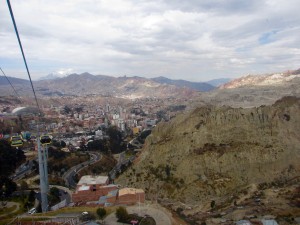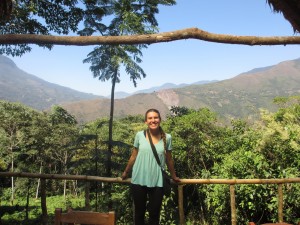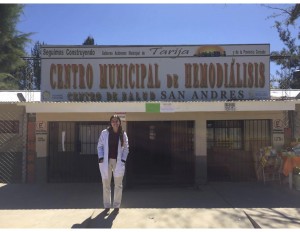Before going to Bolivia, my greatest anxiety was my Spanish level not being high enough. Although my first few weeks were very challenging with being able to understand and  communicate with others in a different language, I am so happy I made the decision to go to a country where not only I would be observing different medical aspects of a new country but I would also be learning a new language. Although it has been amazing to observe medical practices and different forms of health care in a different country, I think it has been even more amazing to improve my Spanish skills and gain the confidence that being able to converse with people in a different language gives.
communicate with others in a different language, I am so happy I made the decision to go to a country where not only I would be observing different medical aspects of a new country but I would also be learning a new language. Although it has been amazing to observe medical practices and different forms of health care in a different country, I think it has been even more amazing to improve my Spanish skills and gain the confidence that being able to converse with people in a different language gives.
I have learned that when I am on my own, I am capable of figuring things out and being independent by myself in a different country, even if I can’t speak the language fluently. Before this trip (in the United States), I would be very shy on asking people for directions or asking people for help if I was confused about something, but being in Bolivia has made me a lot more confident on asking people for help, and for taking initiative for myself in the hospitals (like for which rotations I want to go to, or if I want to go to the emergency room in the evenings). I have also gotten a lot more confident in asking people questions if I don’t understand something in Spanish. A lot of times, all of us students in the program wouldn’t understand something that  our medical director said, or that our Spanish teacher said, and they wouldn’t say anything about it. I was always the one to tell them I didn’t understand everything and ask them to repeat it. I think the greatest reward here has been being able to see things that I wouldn’t have been able to see if I hadn’t taken initiative for myself. For example, I got to see an amazing surgery during my internship, but if I hadn’t asked the doctor if I could go to the emergency room after my rotation, I wouldn’t have been in the hospital when the surgery was going on and I wouldn’t have been able to see it. Additionally, I think me not being scared to try to speak Spanish (or even if I am nervous to try), even when I know that I am going to make mistakes every time I speak has been a great reward because it has allowed me to gain confidence as well as allowed me to improve my Spanish level immensely.
our medical director said, or that our Spanish teacher said, and they wouldn’t say anything about it. I was always the one to tell them I didn’t understand everything and ask them to repeat it. I think the greatest reward here has been being able to see things that I wouldn’t have been able to see if I hadn’t taken initiative for myself. For example, I got to see an amazing surgery during my internship, but if I hadn’t asked the doctor if I could go to the emergency room after my rotation, I wouldn’t have been in the hospital when the surgery was going on and I wouldn’t have been able to see it. Additionally, I think me not being scared to try to speak Spanish (or even if I am nervous to try), even when I know that I am going to make mistakes every time I speak has been a great reward because it has allowed me to gain confidence as well as allowed me to improve my Spanish level immensely.
One of my favorite moments on this trip was when I went to the emergency room after my clinical hours to observe. My roommate and I went to the emergency room because one of the doctors had told us he would meet us there at 8pm. However, when we got there, he had already left and we were left alone, unsure of what to do. The doctor told us he was going to call another doctor that was there and he would help us. The new doctor told us that we were going to go to a surgery with him but to just wait in the room for a little bit until the surgery was ready. In the United States, if someone were to tell me to wait for a little bit I would assume 20 or 30 minutes maximum of waiting, but the culture in Bolivia is definitely different when it comes to the perception of time. Instead of waiting for just a little time as they had said, we waited for almost 2 hours for the surgery to start. While we were waiting we were a little confused what was going on because the doctor that had told us to wait never came back to us during the time we were waiting: were we supposed to keep waiting? Did we hear the doctor correctly? Did the doctor already go into the surgery without us? I think if I hadn’t already been in Bolivia for 7 weeks, I would have left, thinking the doctor had forgotten about us, but because I had been here for almost 2 months, I understood the culture a little more and knew that they wouldn’t have forgotten about us, they are just on a different time schedule. One of the main cultural  differences between Bolivia and the United States is the perception of time (in Bolivia, everyone is at least 20 to 30 minutes late from the predetermined time). Although this cultural difference can be very frustrating at times, I think it has helped me be a little more relaxed and patient, which can be very hard for a perfectionist.
differences between Bolivia and the United States is the perception of time (in Bolivia, everyone is at least 20 to 30 minutes late from the predetermined time). Although this cultural difference can be very frustrating at times, I think it has helped me be a little more relaxed and patient, which can be very hard for a perfectionist.
-Sofia Hardin, Summer 2016